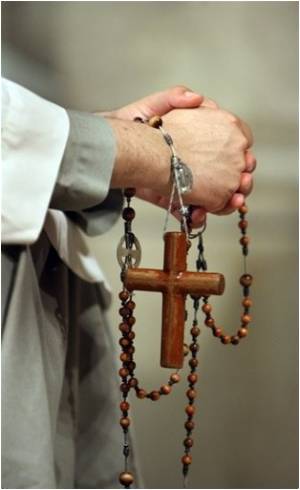
Brother Henri Verges and Sister Paul-Helene Saint Raymond belonged to religious orders dedicated to supporting deprived children, and in their case, educating young Muslims in Algiers.
But their mission was violently ended on May 8, 1994, by gunmen who sprayed them with bullets in a library in the Casbah where they worked.
Like the seven French monks at the Tibehirine monastery south of Algiers who were killed two years later, they knew their lives were at risk in the capital's old city.
Six months earlier, the Islamists had demanded that all foreigners leave the country.
But the archbishop of Algiers, Ghaleb Bader, denies that Christians were persecuted during the civil war, which raged throughout the 1990s and left up to 200,000 people dead.
Advertisement
"There was no persecution of Christians. The church had its share of suffering, paying (like everyone) for the blind violence that struck indiscriminately."
Advertisement
Behind her, on a wall of the Bencheneb library, with its colonnades and mosaics, hangs a picture of Henri Verges.
"These are people who paid with their lives like the Algerians," she says, "with the difference that they had the chance to leave, but chose to stay out of loyalty."
The Casbah library, which was closed after the deadly attack, has now reopened. However, much of the building has since been allocated to homeless families, meaning that only 200 of the 1,200 seats remain.
Sister Veronica says some of the former pupils, who went on to pursue successful careers, return to inquire about their teachers, without knowing the full story of what happened.
"When I tell them, they shed tears," says the Augustinian nun, whose order lost two of its members in October 1994, killed in the nearby Bab El Oued neighbourhood.
Times have changed, and Sister Veronica says she now feels "very welcome" in Algeria.
"If I didn't have friends, if I didn't trust people, I wouldn't have stayed."
-- Monks' deaths unresolved --
Archbishop Bader, a Jordanian, insists that the Catholic community is "not restricted" or discriminated against today in Algeria, whose population is 99 percent Sunni Muslim.
The number of Christians in Algeria is officially estimated at around 10,000, but the real figure is probably much higher, given the thousands of expatriate workers from the Philippines and China, as well as students from sub-Saharan Africa.
The archbishop says he recently celebrated mass with 600 Filipino workers, after getting the "approval" of the local authorities.
As another sign of the ties linking Catholics in Algeria and the Muslim population, he mentions the presence of 20 imams last week at the ceremony to mark the restoration of the Basilica of St Augustine in Annaba.
This was followed by intercommunal prayers to strengthen ties between Muslims and Christians.
Separately, the church in Algeria has distanced itself from a sensitive lawsuit filed in France by the families of the Tibehirine monks, relating to the circumstances in which they died in 1996 after their abduction by Islamist insurgents.
"There is a case that has been brought by some of the families. We are following it, but the church will not take part in it," said Ghaleb.
Having examined the theory that the Armed Islamic Group killed the seven monks, French judge Marc Trevidic is now investigating the possibility that they were accidentally slain by the Algerian army, as claimed by a France's military attache in Algiers at the time.
The judge visited Algeria in November and plans to return when the heads of the decapitated monks are to be exhumed, to make progress with an investigation that has stalled for more than a decade. But no date has been fixed.
Source-AFP








